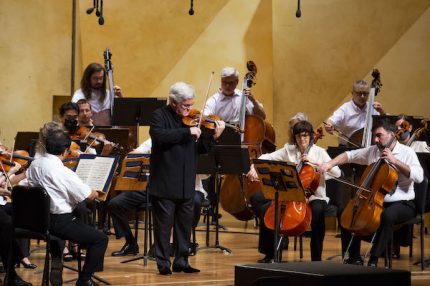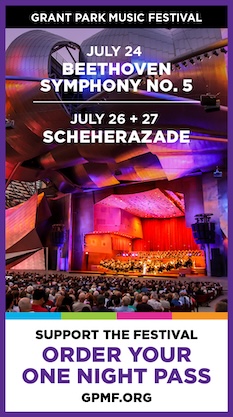Zukerman returns to Ravinia for double-duty act with CSO

Ravinia’s vocal cicadas welcomed back Pinchas Zukerman, as he led a half-lyrical, half-dramatic program of Mozart, Elgar, and Beethoven Thursday night with the Chicago Symphony Orchestra.
Zukerman served as soloist and conductor for the Mozart section, which comprised two short works: the Adagio for Violin and Orchestra, K. 261 and the Rondo K. 373.
These are baubles, not showpieces. They are a test of a violinist’s tone and phrasing, not their technique. Zukerman served an unusual mix: a surprisingly small basic tone (made smaller by the Pavilion acoustic or amplification) yet with the syrupy phrasing one associates with the Romantic school.
Although odd, this worked well enough for the solo part. But Zukerman and the orchestra were not always simpatico. They buried him when they failed to get as soft as he did in some quiet passages. And in ardent moments, Zukerman pushed the tempo forward, leaving the orchestra lagging behind him.
Ensemble cohesion wasn’t a problem once Zukerman set down his violin and took his place on the podium.
Zukerman and the CSO delivered a bucolic performance of Elgar’s Serenade for Strings—easy-going rather than dramatic, but nonetheless alive to the piece’s nuances of dynamics and articulation. They ably characterized the first movement’s dialogue between fidgety violas and smooth, placid violins, the violas grabbing the listener’s attention whenever they bobbed to the surface.
The highlight of the piece was the Larghetto. The broad spectrum of colors and emotions Zukerman elicited from the CSO strings included moments of genuine passion. This contrasted with the perhaps too serene countryside of the finale.
After these pleasant but soft-edged performances, the dramatic rendition of Beethoven’s Symphony No. 2 was a welcome tonic. Zukerman’s interpretation made the work sound more like the Eroica to come and less like the Haydnesque works that preceded it.
It was a grand, old-school performance. None of the clipped articulation and lean textures of today’s dieters. This was brawny in the energetic passages and plush in the lyrical ones.
The slow introduction to the first movement displayed the main virtues of the rest of the performance: careful dynamic shaping (not stinting on hefty accents when required) and a clarity of ensemble balance that was particularly impressive given the orchestra’s dense sound.
Zukerman dialed down the strings in the first movement’s secondary theme to let the winds speak. In the flowing second movement (more Andante than Larghetto), they were easily heard darting around the string melodies. The CSO winds took advantage of such opportunities by delivering supple solo work.
Only the Scherzo fared poorly; with Zukerman failing to enforce dynamic contrasts, Beethoven’s forte/piano alternation became a mezzo-forte muddle.
All recovered nicely for a bracing finale. The attention to balance was even more admirable when maintained in the movement’s blazing tuttis, full of whirlwind energy.
Apollo’s Fire performs music by Vivaldi, Monteverdi and others 7:30 p.m. Tuesday at Ravinia. ravinia.org
Posted in Performances
